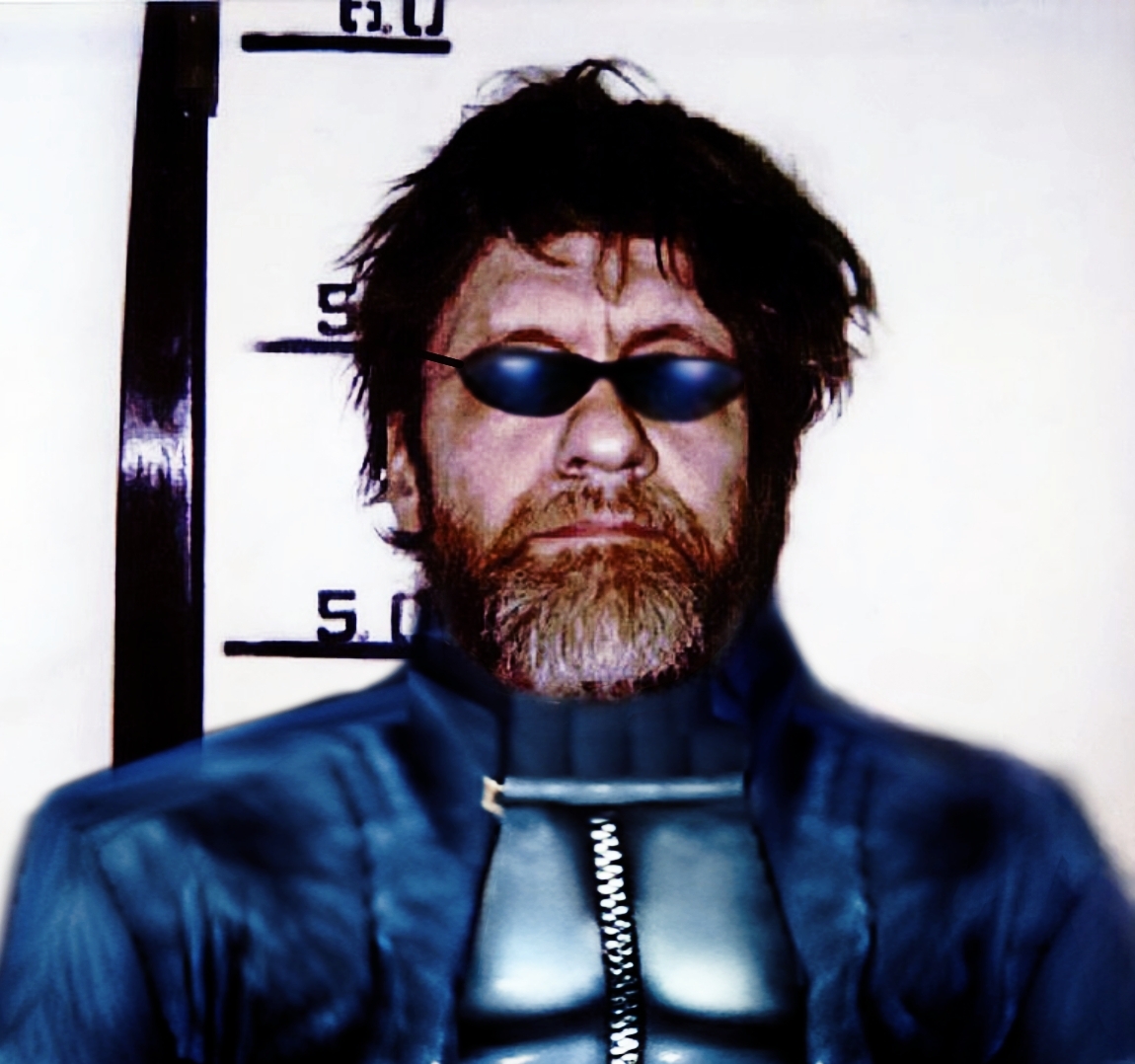Anno: "I don't hate Star Trek, but I'm not impressed by it. You can see the arrogance of America in it. It's a story of influencing or enlightening native peoples of destination planets, that features romance with their most admirable woman in a front-line way. I feel like this is American imperialism itself.
It's like Marxists are portrayed as being primitives. I can't get used to that kind of American worldview. I think the Enterprise is cool, but that's all."
庵野: 『スタートレック』は嫌いじゃないですけど、そんなにはまってはいないんです。なんかアメリカ人の傲慢さが見えててね。行く先の星々の原住民を感化していくというか啓蒙していく話や、最前線の基地では、そこの一番偉い女性とロマンスがある。もう、アメリカの帝国主義そのものという気がしてね。なんかこうマルクス主義の人たちが、原始的なものとして描かれてますよね。ああいうアメリカ的な世界観というのには、どうもなじめなくて。エンタープライズ号は、カッコいいと思うんですけどね。」
Ehhh, sort of. Star Trek is obviously limited by the fact that it's an American television show mostly coming from the era of a limited number of networks making everything, so of course it's going to have problematic viewpoints within it, and it definitely never outwardly tried to subvert the dominant narratives of American hegemony. But within those constraints, I think it's not a coincidence that a lot of lefties see its future as something to aspire to.
Part of why NuTrek sucks so much now is because American capitalism has become so degraded that commercial art produced within it can't plausibly portray a future where anything is actually better.
Part of why NuTrek sucks so much now is because American capitalism has become so degraded that commercial art produced within it can’t plausibly portray a future where anything is actually better.
Anyone know any good critiques -video or text -of NuTrek from a non-chud, leftist perspective? I don't feel like sifting through hundreds of videos of neckbeards saying its bad because of a cultural marxist anti-white agenda. Once saw a comment on Youtube where a guy just pointed out that many of the writers and producers of Picard were Jewish and left it at that :agony-deep:
Well, RLM's dives into NuTrek are good analyses of why it's bad, though they're certainly not leftists. The Plinkett review of Star Trek Picard is great, though you may want to also watch Mike and Rich go through the episodes.
This thread from /r/DaystromInstitute gets into it from a bit more of a lefty political angle. One of the posters mentions Neoliberalism by name, so I guess look for that.
That thread was really good, thank you!
(I of course have seen all of the RLM Star Trek videos a bunch of times already)
Part of why NuTrek sucks so much now is because American capitalism has become so degraded that commercial art produced within it can’t plausibly portray a future where anything is actually better.
The latest season of Discovery felt like an exercise in American exceptionalism in spaaaaaace!
Lower Decks legit slaps. Disco is probably a good non Trek show and Picard is an atrocity. I thought I was going to hate LD but it seems like they sort of accidentally got trek right in an attempt to make it comedic. It's weirdly actually a good continuation of classic 90s era Trek
I wanted to like Discovery but they fucking opened up with "our swarthy fanatic enemies understand only one language, VIOLENCE" and I was out
A lot of TOS is dated by modern standards but I feel like this ignores that a show in the 1960s portrays humans putting aside petty differences to just explore the galaxy.
On the bridge, there's a Russian man, an American man, a Japanese man, and an African woman (I don't think she's got a canonical birthplace but she's fluent in Swahili) and they're all just working together to just learn stuff. They even get along with the alien whose culture is incredibly different from ours.
It's not perfect but it's literally one of the few popular TV shows out there just presents a future that actually seems attainable and liveable.
TNG even attempts to correct for these earlier mistakes by really doubling down on the Prime Directive where the Federation are literally barred from attempted to influence an independent planet's politics so they don't interfere with their natural development. I think they realised how bad some of the "Kirk shows silly aliens enlightened thought" episodes came across and so they attempted to improve it in later series.
DS9 wouldn't exist without those over corrections and making them sorta canon did kick a little ass.
Sounds like he's talking about The Original Series. Someone get him the TNG Bluray boxset, stat
I enjoy TNG and all, but there are episodes of it in the early seasons which would really prove his point.
Remember in Code of Honor where the Enterprise visits a planet of shirtless tribal black people who treat women like shit and try to kidnap Yar to be their leader's bride?
Or in Up the Long Ladder where they pick up a refugee colony of primitive Irishmen complete with the comical drunk?
Season 1 especially had this tone of smug self superiority that would absolutely prove Anno's point.
Both of those episodes are in Seasons 1 and 2, aka the cruddy and mostly cruddy ones, respectively. (As Rich Evans put it recently: Season 1 was filmed in the 80s, based on scripts written in the 60s by writers who grew up in the 30s)
Amendment: Give Hideaki Anno the boxset and also promise him that it'll get better after the first couple of seasons, really
I also agree that TNG improves a fuckload after the first few seasons. I guess I just don't think that the TV equivalent of "Final Fantasy 13 gets better after the first 20 hours" is going to be particularly persuasive.
At least in this case it's true, Final Fantasy 13 getting better later is a DIRTY LIE
The big difference is that you can skip the shitty episodes of TNG.
True. Though on the other hand, if my thesis is "Star Trek is racist American exceptionalism in space", I'm hardly going to be inclined to skip past the episodes which most prove my point.
He's also not totally wrong. I'm a huge huge huge Trekkie and he does make a good point. It's also one that has been addressed to a decent degree in the show, Deep Space 9 could have covered it better but it's there. I'd like to see more of that and have it handled well. The thing is with Star Trek, even though it for sure has super racist and sexist episodes, on the whole they were always at least trying.
Personally, I think that Star Trek (except Nu-Trek) consistently tries to put out a good message, which makes it better than most shows, especially other shows of its era.
However, even though it tries it sometimes misses, sends mixed messages, ends up hamfisted, or accidentally says the opposite of what was intended. Thats fine, the writers are human and humans make mistakes.
My personal stance is that we should critique the bad and embrace the good, not let the bad taint the entirety.
Give him Deep Space 9 to watch after . We had to watch the first 16 episodes of Eva in good faith. He should be able to sit through filler to find the good slop
I gotta give this one to Star Trek, c'mon. Star Trek has produced some of the most thought-provoking television ever put to screen with episodes like The Visitor, The Inner Light, The Offspring and Chain of Command. Anno's ridden one good anime for 30 years and half of its quality was on Gainax's animators. doesn't even have time to don the flame suit before being engulfed
That episode alone gives Star Trek the win. He isn't like.. totally wrong but the show has explored that angle mostly in DS9 (I'd like them to go further with a lot of that while MAINTAINING THE CORE CONCEPT, LOOKING AT YOU PICARD, I'm for real mad that show decided to just shove poverty and drug addiction onto earth to make the more lazy and pointless, the Roddenberry Rules can suck but the core idea is crucial to it feeling like Trek, minimal petty conflict between Starfleet members etc cause also these people are at fucking work, you don't do your big melodramas while at work, especially if lives depend on it being done well. It's pretty much the only show for adults that's aspirational and actually does teach you to be better.
. Anno’s ridden one good anime for 30 years and half of its quality was on Gainax’s animators. doesn’t even have time to don the flame suit before being engulfed
He's a Gainax animator
That's an interesting quote from Anno, honestly kind of insightful cause its very difficult to gauge Anno's own personal beliefs, political or otherwise, based on his works. Interesting to me in the context of his first work Gunbuster which can be seen as pretty nationalistic in a certain light, considering there's an extremely subtle hint in some background info that it takes place in a reality where Japan won the Pacific War. Though fairly that was almost 40 years ago and before he felt like his life collapsed. Japanese alienation and art about it is particularly interesting to me, not necessarily for their conclusions cause they generally tend to have pretty reactionary slants, but because of the contrast between rightful hatred of the united states and a past that they outright refuse to engage with. Which of course is probably going to come to head in an awful way.
Also as somebody kinda mentioned below, I find it really funny that people always claim that the Christian imagery In Evangelion was put there because it looks cool, but it's all associated with the angels which are a literal alien entity coming to wipe out all of humanity based around the dominant religion of the west.
tbf as opposed to his later works he didnt script write Gunbuster. Some of his buddies did
I've been thinking along the same lines about Ian Banks' Culture novels. It's seems like Anglo progressives have trouble imaging their utopian future civilization that is not hegemonic, far ahead in development from everyone else and so powerful that their only concern is finding ways of enlightening savages that minimise collateral damage.
Look to Windward is considered to be one of the best Culture novels. The story goes like this:
spoiler
Culture's CIA tries to bring democracy to the planet of cat-people by bribing and manipulating their politicians. They misjudge how rigid the cat cast society is and precipitate a planet-wide civil war that kills a good proportion of the population.
Cat people are pissed. According to their religion (which is actually true, lmao) the dead must be avenged for them to go to heaven. The cat-military somehow procures an insanely high tech bomb and sends a grieving cat-soldier to 9/11 an enormous Culture habitat. Culture's tech is too advanced so they knew what he was trying to do all along, lol.
Culture sends a sort of ultratech combat cyborg to gruesomely torture and murder the key architects of the plan.
The novel was published in 2000 AD.
On the other hand, now that I think about it, Strugatsky's Noon universe is basically the same thing as Culture but with communism instead of godlike AIs.
Tbh I'm not really convinced by all these influencing other societies = imperialism takes. Shows a very superficial and liberal understanding of imperialism, totally deprived of its economic basis.
In a way it's affirming one of the central myths of colonialism: that's it's done for the sake of the colonized. Like, that's not actually why the AmeriKKKans went around exterminating indigenous people. Like, we weren't going around murdering people and stealing their land to enlighten them.
Also seems to imply the "bumbling empire" trope. I've seen it invoked a few times with comparisons between both The Culture and the Federation and the Iraq War, the idea being that the Iraq War is what you get when you try to intervene in other cultures' affairs, as if it was so awful because it was "interference" and not because it was literally just fucking invading and looting a country for profit.
Like, if you run across a genocidal fascist space empire (like in The Culture and Star Trek), obviously you kick the shit out of them. That's not imperialism in any remotely Marxist sense.
The point about Noon having a really similar approach to utopian space communist intervention is a good one, I think; it shows that the desire to influence other societies in a sci-fi setting isn't necessarily rooted in colonial attitudes.
I don't actually think that Star Trek, Culture or Noon people are imperialist. I just find it interesting that in some of the most influential utopian sci-fi settings the utopian good guys are by far the biggest dogs on the block and mostly deal with people much less powerful than them. Maybe I'm reading too much into it...
No, that makes sense. I guess it might have something to do with what kinds of conflicts you can have in utopias, since they kind of have to be externally driven since everything's so great inside, but at the same time it's interesting that the stories tend to be about powerful utopias deciding what to do with their power. Might reflect the countries the authors came from, being hegemonic in different ways.
Anyway, I wasn't really responding to you directly, more the general idea that I think is annoying, which your post reminded me of, and I tend to get ranty when I'm caffeinated.
Might reflect the countries the authors came from, being hegemonic in different ways.
That was my first thought as well.
The spoiler you wrote sounds kind of like Banks is trying to do a scathing critique of interfering with other peoples' societies. That said, I haven't read that particular book yet.
Also, thr Culture isn't necessarily far ahead of everyone else, they're just far enough away from most powers that haven't chosen to ascend beyond the material plane yet.
IIRC, the whole point of Excession is what happens when the smug Culture encounters a phenomenon so advanced and exotic that they have no idea how to engage with it.
scathing critique
I wouldn't call it a scathing critique. I'd say it's portraited as a honest mistake by well-meaning people.
Both Culture and Noon have those spies that are tasked with meddling with affairs of other less advanced civilizations, always for those civilizations' sake. Their work is considered shady, dirty, occasionally soul-destroying, but in the end probably something that has to be done. In most novels Culture's machinations end up being for the best.
Not claiming that Banks had bad politics, but it's fascinating how the foreign policy of his utopian society mirrors the way neolibs and neocons rationalise US foreign policy.
from qmisato https://qmisato.tumblr.com/post/168590592057/hideaki-anno-greatest-hits-anno-listing-tom-and
西洋文明ってきらい
Damn, he used きらい? That's as close as most Japanese people will get to saying that they fucking hate something.
For reference, "kirai" which he used, is generally an intense dislike, bordering on hatred. For regular dislike most Japanese people use "好きじゃない", which is literally "do not like".
Really? My Japanese still isn't really fluent after 10 years, but I don't take it that way. 「嫌いだ」 can be pretty close to "fucking hate." 「きらいなんですよ」 is more like "I really dislike," and almost sounds like he's explaining why he won't eat the broccoli.
My understanding is that 大嫌い is close to "I really (fucking) hate" but its considered crass to use it in a context where you're not super close to the person you're speaking with.
At the other end of the spectrum, people who are trying to express a neutral-ish dislike for something will use "好きじゃない", often softened with "あまり".
So to me, "きらい" implies a strong dislike, bordering on hatred because its stronger than "好きじゃない", but of course direct translations are always a shitshow.
The "なんですよ" part I just take to be a linking flourish to the question or previous sentence.
This is just based on some classes and my observations of native speakers using it in every day practice. So if a native speaker wants to chime in I'm happy to be corrected.
I always feel like I glean as much meaning from those "linking flourishes" as the specific words used. I take なんです as kind of a softened version of the explanatory の (compare the feminine なの), and ですよ is pretty easygoing overall (not that these are really "words" that people think about). So I take きらいなんですよ as almost "I just hate it, you know?" It's certainly not diplomatic, but it's not scandalous either.
大嫌い is pretty much 嫌い with an intensifier, so yeah "fucking hate" instead of "hate." (And putting it that way makes me wonder if anyone's tried to say 超嫌い or 極嫌い seriously in a fight, and how hard their opponent laughed at them when they did.)
EDIT: Maybe the thing that makes me feel this way is that 嫌い, although it means "hate", is an adjective. So although the translation has Miyazaki just piping up with "I dislike western civilization," in context it's more like he's (slightly facetiously) offering an explanatory addendum to what Oomori said. Evangelion is more along the lines of western civilization, and of course western civilization is hateful/distasteful/(non-existent-English-adjective-stronger-and-more-personal-than-"distasteful")---you can't trust it.
Why would he say something so controversial, yet so brave?
Infinite diversity in infinite combinations. The Federation does do some colonial shit that they lights cut out but hauling around space for the sake of seeing what's in space is appealing as hell
It's like a religon. Filtered through it's current culture. It's the ideas behind them that I like not the dogmatic doctrine of the universe created by flawed individuals with their own biases. :shrug-outta-hecks:







